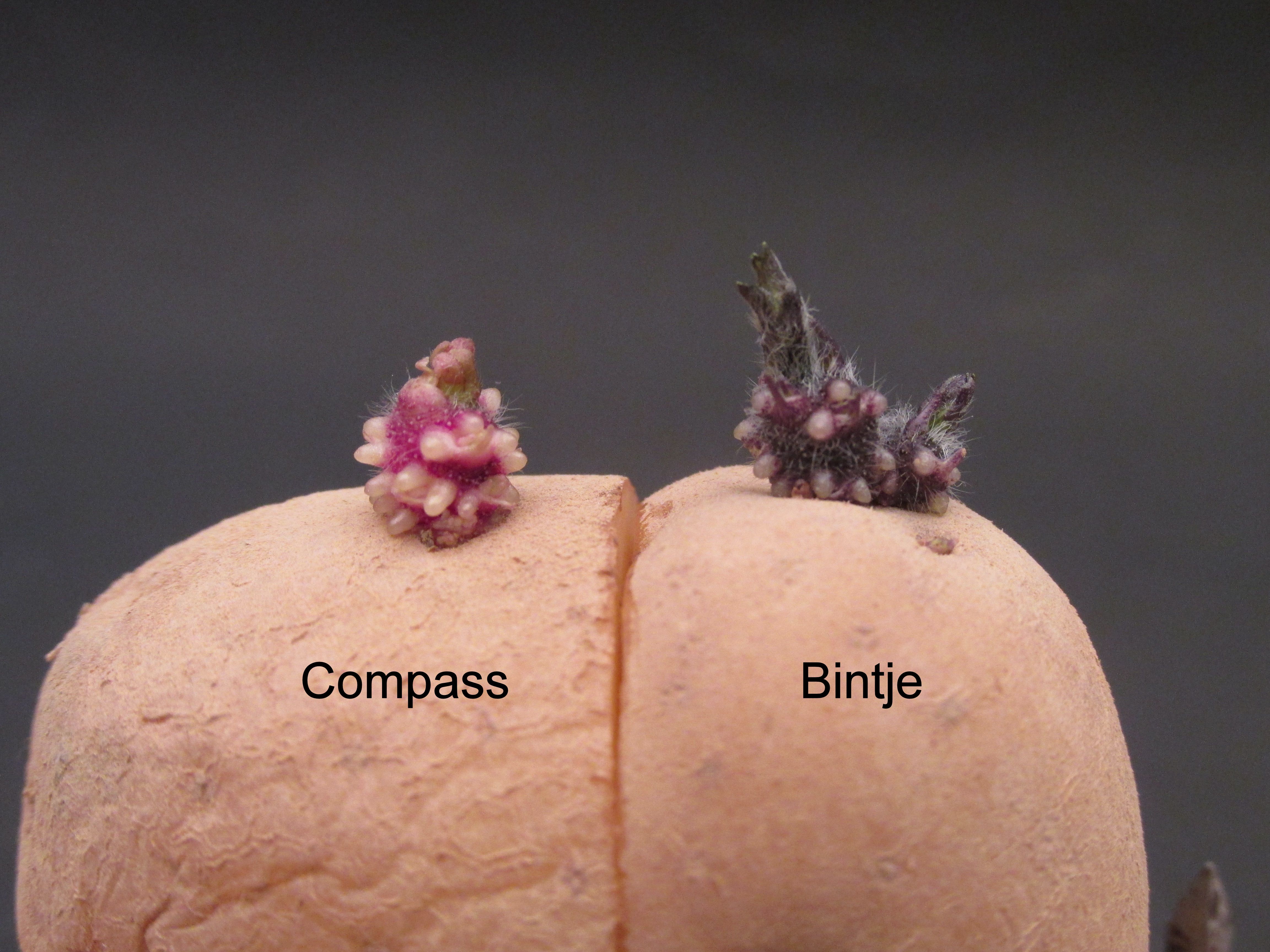Compass
| Denomination: | 'Compass' |
|---|---|
| Botanical Name: | Solanum tuberosum |
| Applicant/Holder: |
IPR B.V. P.O. Box 88 8500 AB Joure Netherlands |
| Breeder: |
R. P. Graveland, IPR B.V., Joure, Netherlands |
| Agent in Canada: |
HZPC-Americas Corp. 19 Regis Duffy Drive Charlottetown, Prince Edward Island C1E 0K5 Canada Tel: 902-892-2004 |
| Application Date: | 2014-04-08 |
| Application Number: | 14-8261 |
| Grant of Rights Date: | 2017-02-22 |
| Certificate Number: | 5421 |
| Date rights surrendered: | 2018-01-30 |
Variety Description
Variety used for comparison: 'Bintje'
Summary: The intensity of anthocyanin colouration of the base of the lightsprout is strong for 'Compass' whereas the intensity is very strong for 'Bintje'. The proportion of blue in the anthocyanin colouration of the base of the lightsprout of 'Compass' is absent or low whereas the proportion of blue is high for 'Bintje'. In relation to the base, the size of the tip of the lightsprout of 'Compass' is small whereas the tip is of medium size for 'Bintje'. The plants of 'Compass' are shorter than the plants of 'Bintje'. The extent of anthocyanin colouration of the stem and upper side of the leaf midrib of 'Compass' is absent or very low whereas the extent is low for 'Bintje'. The intensity of anthocyanin colouration on the upper side of the leaf midrib of 'Compass' is absent or very weak whereas the intensity is weak for 'Bintje'. The frequency of coalescence of the terminal and lateral leaflets is absent or very low for 'Compass' whereas the frequency of coalescence is low for 'Bintje'. The extent of anthocyanin colouration of the peduncle of 'Compass' is high whereas the extent is medium for 'Bintje'. The size of the corolla of 'Compass' is medium to large whereas the corolla of 'Bintje' is small.
Description:
LIGHTSPROUT: small to medium size, ovoid shape, medium number of root tips, short lateral shoots
LIGHTSPROUT BASE: strong intensity of anthocyanin colouration, absent or low proportion of blue in anthocyanin colouration, sparse to medium density of pubescence
LIGHTSPROUT TIP: small in relation to base, closed habit, medium intensity of anthocyanin colouration, sparse pubescence
PLANT: foliage structure is intermediate to leaf type where foliage is half open to closed and stems are partly to hardly visible, semi-upright growth habit, mid-season to late maturity
STEM: no anthocyanin colouration
LEAF: outline is large, openness is open, medium green on upper side, absent or very low extent and absent or very weak intensity of anthocyanin colouration on upper side of midrib, weak to medium presence of secondary leaflets, absent or very low frequency of coalescence of terminal and lateral leaflets
SECOND PAIR OF LATERAL LEAFLETS: medium to large, leaflet is narrower than long
LEAFLET: weak waviness of margin, medium depth of veins, glossy upper side, glabrous blade at apical rosette
INFLORESCENCE: medium frequency per plant, small size
PEDUNCLE: high extent of anthocyanin colouration
FLOWER BUD: high extent of anthocyanin colouration
COROLLA: medium to large
COROLLA (INNER SIDE): absent or very low extent of anthocyanin colouration, absent or very weak intensity of anthocyanin colouration, absent or low proportion of blue in anthocyanin colouration
TUBER: oval to long oval shape, light yellow flesh
TUBER EYE: medium depth, yellow at base
TUBER SKIN: yellow, develops absent or very weak intensity of anthocyanin colouration in reaction to light
Origin & Breeding History: 'Compass' originated from a cross conducted at HZPC Research and Development in Metslawier, Netherlands, in 1999, between the varieties 'Pallas', as the female parent, and 'Voyager', as the male parent. The resulting seedlings were tested in the Netherlands and at different testing locations abroad. 'Compass' was selected in 2000 for its yield, internal and external quality, and resistance to different diseases and pests.
Tests & Trials: The comparative trial for 'Compass' was conducted during the growing season of 2015 in Drummond, New Brunswick. The trial consisted of a single, 18.5 metre long row containing 60 plants spaced 0.3 metres apart for each variety. The distance between rows within the trial was 0.9 metres. Observations and measurements were taken from 10 plants, or 10 parts of plants, of each variety. Mean differences were significant at the 5% probability level based on a paired Student's t-test.
Comparison table for 'Compass' with reference variety 'Bintje'
Plant height (cm)
| 'Compass' | 'Bintje' | |
|---|---|---|
| mean | 35 | 55 |
| std. deviation | 3.4 | 1.6 |
Click on image for larger view

Potato: 'Compass' (left) with reference variety 'Bintje' (right)
- Date modified: